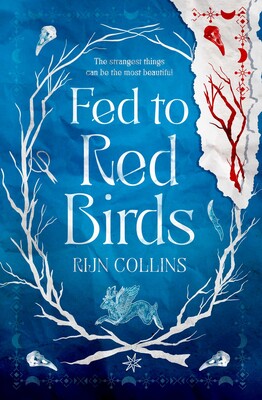Fed to red birds by Rijn Collins

A story from Iceland, with snow, fairytales, stuffed creatures, and unusual characters, Rijn Collins’ debut novel creates a strange but fascinating world that draws you in. Elva has come from Australia to Iceland, the home of her mother, the mother that disappeared when she was 7 years old. She has found a job with 60 year-old Grace, working in her shop ‘Cabinet of Curiosities’, a trove of ancient and bizarre treasures. Elva’s own apartment is home to a bat, snake, mice, even a hare, preserved by taxidermy, an art that she is learning at her kitchen table. In addition, Elva has OCD, obsessively counting and checking things around her. There is also a door, beneath the table, that leads to a space packed with books, all the same book, the macabre fairytales written by her beloved grandfather Afi.
Although Elva suffers anxieties, she has a caring group of friends that includes Grace, and also Tolli, a former boyfriend. They both look out for her and accept her ‘unpredictablity’. So when she is drawn to a handsome tattooed Frenchman, they are supportive but cautious in their encouragement.
The central mystery is the hidden store of books – why is that particular book such a source of fascination and dread? And what is it that really happened to Elva’s mother? Only Afi has the answers, and he has had a stroke, conscious but confined to hospital in the north of Iceland.
Collins’ debut novel is enchanting and mysterious; the characters are so interesting, and despite their oddities, very believable. It is a magical mystery of a story, and creates empathy for people who are different, dealing with their own challenges, both psychological and social. The cold and stillness of the environment further emphasize the sense of isolation, but the little group of friends that gather together is warm and very caring.
Fed to red birds has some themes in common with The art of taxidermy by Sharon Kernot (2018). Both see taxidermy as a way of ‘preserving the dead, or rather, bringing that back to life’. Both portray outsiders having to come to terms with grief and loss sustained in childhood.
Themes: Iceland, Fairy stories, Taxidermy, Obsessive compulsive disorder, Xylophagia, Grief, Anxiety.
Helen Eddy